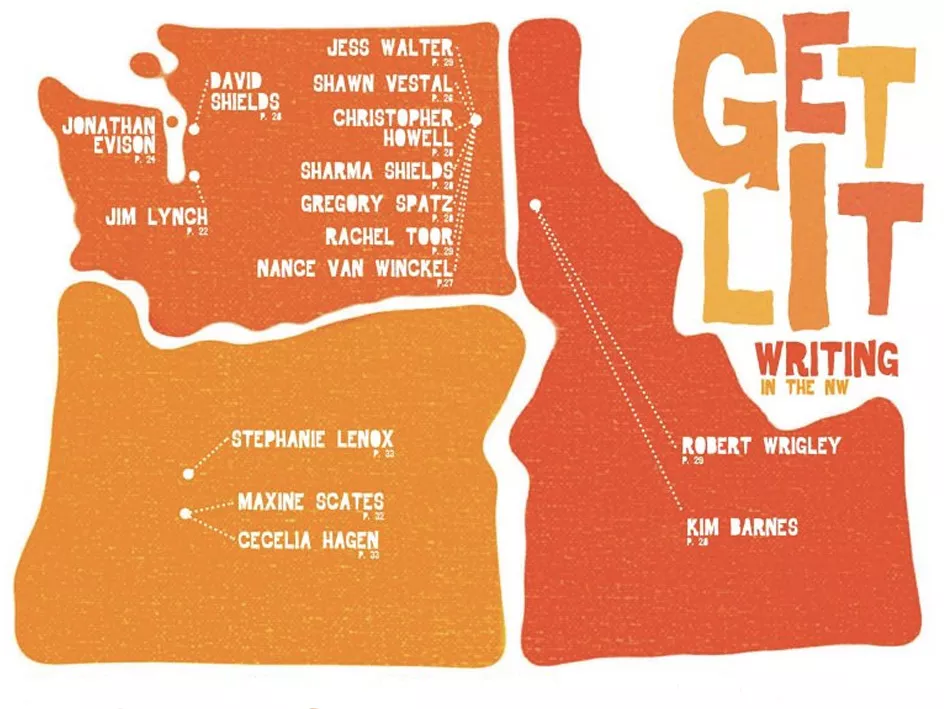Under the bright lights of the Woman’s Club of Spokane, Sam Ligon was out of pie and whiskey.
He’d invited Spokane to hear a dozen writers read stories, and Spokane had shown up. With a crowd in front of him, at least half of them pie- and whiskey-less, he expected disappointment or at least a rush out the door. But, instead, people settled into chairs around round tables and looked toward the podium.
“Maybe the reason 300 people came was for free pie and whiskey, but they stayed for the readings,” Ligon says. “That’s pretty incredible.”
Ligon and others plugged into the local writing scene say it’s on the rise — and fast. Local writers are gaining national attention and young authors are showing promise to do the same. Professors and booksellers say that’s thanks to everything from events like Get Lit! to the region’s geography.
When Ligon talks about the local writing scene, he’s downright giddy. A fiction writer, MFA professor at Eastern Washington University and editor of local literature journal Willow Springs, Ligon talks fast and rattles off authors’ names. There are 20 or 25 people in the Spokane and Moscow area whose work he wants to read, he says, and for a community of this size that’s something to be proud of.
He cites up-and-coming writers like Shawn Vestal and Laura Read and local favorites making it big like Jess Walter: “The amount of quality work coming out of here is unbelievable.” Not to mention, he adds, plenty of reading series, from Riverpoint Campus’ Naked Lunch Break to the poetry-focused Broken Mic held at Neato Burrito every week. (Ligon admits he misses the Empyrean, “but there are other venues,” he says.)
“It’s a small community, so everybody knows each other, and that vibe is healthy and good,” he says. “Nobody’s snotty, so you’ve got a really supportive community of writers.”
That community extends to local booksellers, says Auntie’s manager Melissa Opel. Auntie’s hasn’t been immune to recent book industry struggles. They’ve seen sales drop — about 5 to 10 percent between the last two Christmas seasons, Opel says — and more people turn to e-books. But independent bookstores are still havens for local authors and the readers looking for them. A store like Auntie’s or BookPeople Of Moscow can help readers find local authors and genres they might not normally seek out. Tell the store what types of books you like and ask for suggestions, or drop in for a reading and discover a new author. That’s something Amazon can’t provide, at least not in the same way, Opel says, and it keeps the scene vibrant.
“A lot of authors who start local and make it big have done so on the backs of independent bookstores,” she says (quick to add that credit obviously goes to good writing too). “People in indies are reading these books and putting them into customers’ hands.”
Doug Heckman, director of the University of Idaho’s MFA program, says having successful writers who got their start in the area now willing to share experience and advice with students helps perpetuate good writing. But Heckman is also trying to encourage young writers to simply get out. His programs feature retreats and workshops in wilderness areas to get students exploring new areas and, in turn, new ideas.
“To a lot of people this is a brand-new environment,” Heckman says. “Some people use it to be startled into a new reality or to put on new glasses. Others find the quiet is a chance for reflection in these environments.”
It’s a combination of those factors we can thank for a writing scene that’s lively and growing, says Ligon, but for now he’s thinking about whiskey and pie again. He’ll have more this year than last, he says, but he still hopes to run out.
CHRISTOPHER HOWELL
Hometown: Spokane
Specialty: Poetry
Start with: Gaze, Dreamless and Possible, Light’s Ladder
An award-winning poet and creative writing and English professor at Eastern Washington University, Christopher Howell started his writing career as a Navy journalist during the Vietnam War. If we could guess, though, the things he wrote about then were probably the complete opposite of the rhythmic and reflective poetry he now is known for. The imagery Howell crafts in his work is incredibly vivid and moving. In a piece titled “Something Borrowed,” about his late daughter Emma, an aspiring poet who died at age 20, Howell creates a highly emotional dream scene of what could have been her wedding, eight years after her death.
Of his work, the Portland-born poet and writer says, “Poetry, for me, is the only means of reconciling the objective, everyday world with the inner life, the ego with the self. In that reconciliation, that enactment, it seems to me very like worship: a humane and primary response. If I felt otherwise, it would not be worth doing.”
Howell recently released his ninth collection of poetry, Gaze. Most notably, he’s been awarded two National Endowment for the Arts fellowships and three Pushcart Prizes. For non-savvy folks, the Pushcart is a big deal, and each year honors the best poetry, short fiction, essays and other literary works published by small presses across America. (CHEY SCOTT)
KIM BARNES
Lives in: Moscow, Idaho
Specialty: Fiction, memoir
Start with: In the Kingdom of Men, In the Wilderness
In 1997, Kim Barnes came out swinging with her first book, In the Wilderness: Coming of Age in Unknown Country — which won the PEN/Jerard Fund Award and was a finalist for the Pulitzer Prize. That book centered on Barnes’ upbringing in rural Idaho, and set the stage for her next work, Hungry For the World, in which she told the story of detaching from her Pentecostal family to find a world of her own. She would test her pen at fiction next, but continued to focus on characters enduring through exceptional hardships and circumstances. No matter what the genre, throughout her work Barnes shows an affinity for capturing the solitude of rural America — the way the forests smell and the way wind makes a wheatfield wave. Her newest work, In the Kingdom of Men, was released last fall. (LEAH SOTTILE)
SHARMA SHIELDS
Hometown: Spokane
Specialty: Short fiction
Start with: Favorite Monster
Sharma Shields’ writing is praised for being fabulist and satirical, lighthearted and then dark, but also very funny. Readers of her short fiction will become immediately engaged, entertained and maybe a bit shocked at the end, but still wanting more, say those who have praised the Spokane author’s debut collection of short stories, Favorite Monster. And though on the surface Shields’ award-winning collection may look like purely fun stories, as readers delve into her work, they’ll realize her writing reveals the innermost workings of human emotions: obsession, loneliness, guilt and desire. Take her story “Souvenirs” for example. Set in our own Spokane, it’s an insightful tale of a young woman’s speculations that her strangely attractive, odd neighbor is a serial killer; at the end Shields throws in a twist that is mostly unexpected but also profoundly revealing of her characters. Reading this or any of Shields’ other short stories should make just about anyone clamor for more of this up-and-coming writer’s fresh and witty prose. (CS)
DAVID SHIELDS
Lives in: Seattle
Specialty: Auto-non-biographi-fiction
Start with: How Literature Saved My Life
Trying to put David Shields in a tiny box of genre classifications is just looking for trouble. In fact, a good deal of his work deals with challenging the idea of genre in art altogether — Shields has been famously quoted, “Art is a conversation between and among artists, not a patent office.” His controversial book Reality Hunger: A Manifesto reflects that idea, patchworking together hundreds of unattributed quotes from artists. Shields drives head-on into postmodernism in The Thing About Life Is That One Day You’ll Be Dead, a book that is as much about the facts of the human body as it is about the reality of how fragile our lives are. (LS)
GREGORY SPATZ
Lives in: Spokane
Specialty: Fiction
Start with: His new book, Half As Happy: stories
We’d be willing to bet that Gregory Spatz is the only person in the Spokane area who is a published fiction author who also plays the bouzouki. If you’re not the type to doggedly track local authors, you might know Spatz as a musician first and foremost. He plays fiddle in John Reischman and the Jaybirds, and bouzouki in an old-timey string band called Mighty Squirrel. But he’s also got a hell of a fiction résumé: the man has written three books and been featured everywhere from the Kenyon Review to The New Yorker. And last year he won a National Endowment for the Arts literature fellowship. His stories often deal with loss, searching for renewed life and, very occasionally, the fiddle. (LS)
REBECCA STEAD
Hometown: New York City
Specialty: Youth fiction
Start With: When You Reach Me
One of the reasons Get Lit! has remained so popular, and increasingly so as the years go on, is thanks to the eclectic collection of its authors. This means that the festival doesn’t exlude the young readers among us, which is why Rebecca Stead, an accomplished young-adult and children’s fiction writer, is here this year.
Stead, a successful attorney working in a public attorney’s office when she began writing fiction, eventually turned children’s literature into her full-time job with the publication of First Light, a story about a boy on a trip to Greenland with his parents. In 2009, she published When You Reach Me, which won the prized Newbery Medal, widely recognized as the top prize for children’s literature. Now Stead is back, this time using her hometown as influence for the urban setting of Liar & Spy, a story about an unlikely friendship between two boys in an apartment building. (MIKE BOOKEY)
RACHEL TOOR
Hometown: Spokane
Specialty: Creative nonfiction
Start with: Personal Record: A Love Affair With Running, The Pig and I
Rachel Toor didn’t start running until she was 30, but since then she’s become totally hooked on it, running lots of marathons and ultramarathons; super long-distance races that to those of us non-runners sound completely insane. We’re talking distances of 50 to 100 miles — pretty crazy. Toor, also an EWU assistant professor of creative writing for the university’s graduate writing program, wrote a book about her running obsession, called Personal Record: A Love Affair with Running. It’s a book that’s bound to be interesting even to the most profound running-hater among us, telling the story of how a simple hobby can become a life’s passion. Toor also regularly contributes to several running and fitness publications and has written a comedic memoir, The Pig and I, about her up-and-down past romantic life, full of ironic comparisons of the men she dated to the menagerie of pets she owned over the years, including — you guessed it — a pig. Keep an eye out for this local runner/author’s first fiction novel, Hitting the Wall, that’s scheduled to come out sometime next year. (CS)
Hometown: Spokane
Specialty: Massive works of fiction
Start with: Beautiful Ruins, We Live in Water
If you read books and live in Spokane, you should know the name Jess Walter. He’s the guy who wrote Beautiful Ruins, which Esquire magazine called the best book of 2012. That novel is a devastatingly impressive piece of writing that jumps between the 1960s, the present and times in between while traversing the globe from Italy to Los Angeles to nearby Sandpoint, Idaho, all the while spinning a well-crafted tale of love lost.
In February, Walter — a former Spokesman-Review reporter — was back in the literary spotlight with the release of his first collection of short fiction, called We Live in Water. The stories, many of them about down-on-their-luck folks, show Walters’ literary range, especially when you get to his “Statistical Abstract of My Hometown, Spokane, Washington,” a list of observations from his life spent living in the Lilac City, a metropolis whose many woes can be traced back to grown-ass men who employ BMX bikes as a primary source of transportation. (MB)
ROBERT WRIGLEY
Hometown: Moscow, Idaho
Specialty: Western poetry
Start with: Reign of Snakes, Anatomy of Melancholy
If there’s a poet out there who uses the landscape as a living, breathing character in his work, that man is Robert Wrigley. This guy plays the mountains, plains and forests of the American West like a fiddle in his poems, which have been published in magazines and journals the around the world.
Wrigley, like his wife, the novelist Kim Barnes, is a professor at the University of Idaho, and spent the late 1980s as the writer in residence for the state of Idaho. He’s the winner of two Pushcart Prizes and numerous other accolades, including fellowships with the National Endowment for the Arts. His most recent collection of poetry, Anatomy of Melancholy, was released just last week and already is garnering praise from critics and fellow writers alike. The collection’s titular poem is a masterful collision of Wrigley’s trademark pastoral imagery and references from history, spirituality and pop culture. In short, it’s a hell of a piece from a poet from whom we in the Northwest have come to expect nothing less. (MB)







